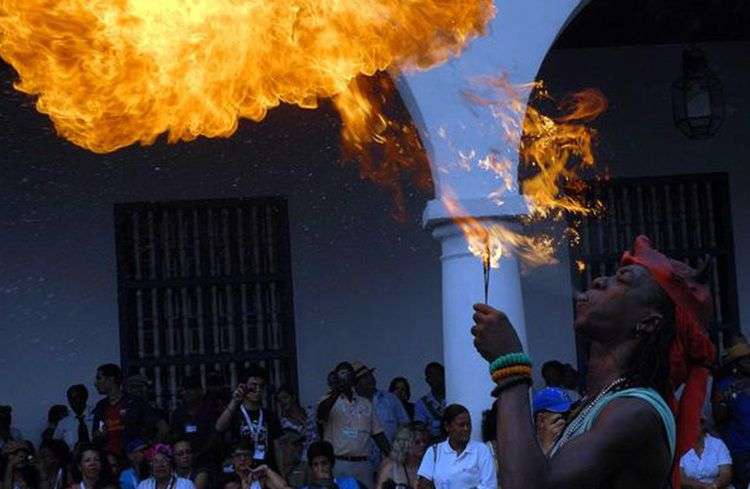The Caribbean is some sort of melting point for ethnic, cultural, language and religious plurality. Even though this region is diverse in terms of culture and beliefs, the Caribbean is actually united. For that reason, the Cuban eastern province of Santiago de Cuba has hosted the Caribbean Festival, also known as Feast of Fire, continuously since 1981 till present day.
Traditionally, this festival takes place annually from July 3 through 9. This time, it is dedicated to the Republic of Surinam. The program of the festival includes cultural events as well as theoretical spaces on different subjects: an International Colloquium “El Caribe que nos une” (The Caribbean that brings us together); workshops on popular religions, theater, music, natural and traditional medicine; among other activities.
Kenia Dorta Armaignac, Deputy Research Director of the Caribbean House and organizer of the event, commented for OnCuba about the origins of the festival, its founder and some of the activities arranged for this 34th edition.
How did the Caribbean House emerge?
It emerged in the early 80’s, when Joel (James) was a history assessor for the Conjunto Dramático de Oriente, then called Talento Teatral Santiago. There, he worked with actors such as Carlos Padrón, Raúl Pomares, among others, and with researchers that also played the role of actors and directors. Thus,it emerged out of the need of creating an institution for researching that invisible portion of the Cuban society and migration of those groups that are part of the national identity and have had a space in this eastern province.
Hence, this project looks at the Caribbean as an experience to be, to feel and understand that part of the world and that in Cuba there was a cultural diversity unknown and unrecognized till then, and invisible in terms of the construction of the national identity which privileged other approaches and didn’t recognize its contributions to society. Finally, the Caribbean House was officially founded in June 1982.
The first edition of the festival was held in April, 1981. How would you describe the work of this institution in preserving and reforming subsequent editions till present day?
Our institution is based on two principles: Research and Promotion. Research is carried out with the necessary academic rigor and ethical principles. The object of research becomes the subject. The purpose of our investigationsis to honor that subject. On the other hand, the promotion is achieved through the festival, which works as a platform for regional integration on Caribbean processes from the culture. The festival also spreads knowledge and offers a space for academicians, community leaders, political authorities, etc. to meet and dialogue and thus honor that invisible culture.
Since its foundation, our House has opened many doors and it has contributed with that sense of belonging by the youngest generation born with the Revolution, a sense of being closer not to the Caribbean elite or its great figures but to the culture, to artistic groups that are not known in the most important art circuits and are thus honored and recognized. The festival has changed; it has gained experience and knowledge.
Joel James hasbeen a key figure for the Caribbean House, and for these festivals. How have you preserved his legacy?
The Caribbean House would not exist today without the foundational work carried out by him and a group of colleagues, with scientific questions on the expressions of popular culture and identity elements of Santiago de Cuba and the eastern region of the country. Joel is the founder, the manager and the conceptual creator of this institution. He is the father of this project. We are all heirs of his work, that’s why he is still alive among us.
Joel was born in Havana but his family moved to Banes in the eastern province of Holguin. In that physical, cultural and historic space he found a migration from the West Indies, basically from Haiti, as well as an US migration, all of which coexisted with the Cuban creole society. Then, he exiled in Jamaica as a result of his involvement in the Cuban revolutionary process, and with the triumph of the Revolution he returned to Cuba. Therefore, for him the Caribbean is part of his identity.
Nonetheless, he didn’t only approached the Caribbean academically (he majored in History at the Eastern University), but also personally, where the Caribbean is an experience, a way of understanding the world and sharing a cultural space, in a broad sense, which includes regional, geographic and physical elements.
In 2008, the colloquium “Joel James In Memoriam”, celebrated in January on the occasion of his birthday, was created. Several researchers meet with the purpose of preserving his legacy and debatingon his anti-hegemonic position. Thus, he is with us in the festival and in January in the colloquium. In this edition, the festival will present the Caribbean House International Award to Surinam’s Wild Communities. Can you comment on the activities arranged in the program to pay homage to this nation?
A bust of eminent Surinamese poet and cultural icon Robin Drobú will be unveiled at the Avenida de las Americas in the eastern province, close by other independence heroes from the American continent.
What do you have already in mind for the next festival? What nation will it be dedicated to?
Next years’ festival will be dedicated to the 500th anniversary of the Foundation of the Village of Santiago de Cuba and to its people, so all our energy will be focused on that.










